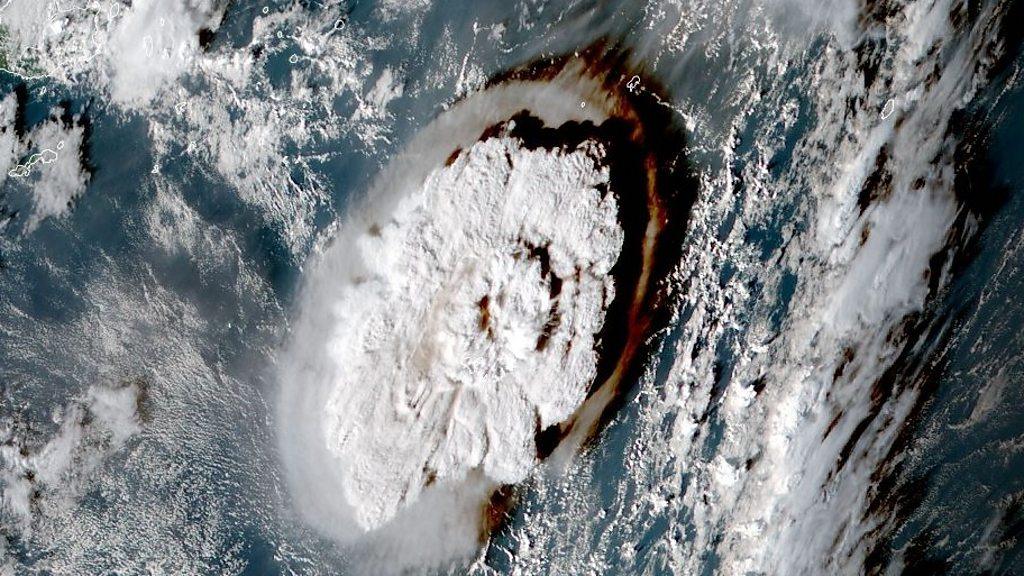Get away from shore - US and Japan warn on tsunami
- Published
Watch: Satellite images capture the eruption of Hunga Tonga-Hunga Ha'apai
The US and Japan have advised people on their Pacific coastlines to get away from the shore as a precaution against tsunami waves caused by a volcano eruption in the South Pacific.
Japan has warned of waves as high as three metres, and waves of 1.2 metres hit the south of the country.
The US warned of strong currents and waves, and coastal flooding.
The huge underwater volcanic eruption caused waves of more than a metre to crash into Tonga.
The eruption of the Hunga Tonga-Hunga Haʻapai volcano was heard across the South Pacific, and eventually as far away as the US.
Many parts of Tonga, whose capital is just 65km (40 miles) south of the eruption, are covered in ash and are experiencing a near-total blackout of power, phone lines and internet services. The extent of any injuries or damage is still unclear.
Social media footage showed water washing through a church and several homes, and witnesses said ash was falling over the capital, Nuku'alofa.
Allow X content?
This article contains content provided by X. We ask for your permission before anything is loaded, as they may be using cookies and other technologies. You may want to read X’s cookie policy, external and privacy policy, external before accepting. To view this content choose ‘accept and continue’.

Videos on social media showed traffic jams as people tried to flee low-lying areas by car.
One resident, Mere Taufa, said the eruption had hit as her family was preparing for dinner, and her younger brother had thought bombs were exploding nearby.
"My first instinct was to take cover under the table, I grabbed my little sister, and screamed at my parents and others in the house to do the same," New Zealand news site Stuff.co.nz quoted her as saying.
Ms Taufa said the next thing she knew, water was rushing into their home.
"You could just hear screams everywhere, people screaming for safety, for everyone to get to higher ground," she added.
The plumes of gas, smoke and ash pouring from the volcano reached 20km into the sky, Tonga Geological Services said.


In Japan, the 1.2m tsunami was recorded in the Kominato district of Amami-Oshima Island in Kagoshima Prefecture at 23:55 (14:55 GMT) on Saturday.
So violent was the initial eight-minute eruption that it could be heard as "loud thunder sounds" in Fiji, more than 800km away, according to officials in the capital, Suva.
The Fijian government issued a tsunami advisory and opened evacuation centres for people in coastal areas. Vanuatu, another island nation in the Pacific, issued a similar warning.
Prof Shane Cronin, a volcanologist at the University of Auckland, said the eruption was one of the biggest in Tonga in the past 30 years.
"This is a pretty big event - it's one of the more significant eruptions of the last decade at least," he told the BBC.
"The most remarkable thing about it is how rapidly and violently it's spread. This one was larger, a much wider lateral spread, much more ash was produced. I expect there to be many centimetres of ash that have been deposited on Tonga."
A spokesperson for the Australian government said the prime minister and minister for foreign affairs were monitoring the situation and ready to provide support on request.
A tsunami warning has been issued for parts of Australia's east coast and Tasmania.
In New Zealand, which is more than 2,300km away from Tonga, the National Emergency Management Agency said coastal areas on the north and east coast of the North Island could see "strong and unusual currents and unpredictable surges at the shore".
Local forecaster Weather Watch tweeted about the eruption: "The energy release is simply astonishing", adding: "Reports of people hearing the sonic booms across New Zealand."

Did you witness the volcano? If it is safe for you to do so email haveyoursay@bbc.co.uk with your experiences
Please include a contact number if you are willing to speak to a BBC journalist. You can also get in touch in the following ways:
WhatsApp: +44 7756 165803
Tweet: @BBC_HaveYourSay, external
Please read our terms & conditions and privacy policy
If you are reading this page and can't see the form you will need to visit the mobile version of the BBC website to submit your question or comment or you can email us at HaveYourSay@bbc.co.uk, external. Please include your name, age and location with any submission.
- Published15 January 2022
